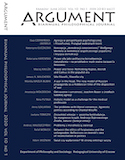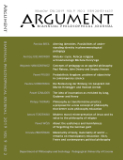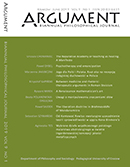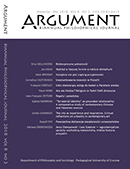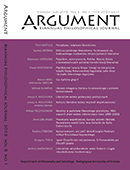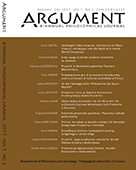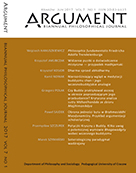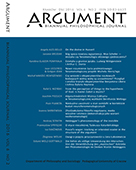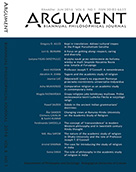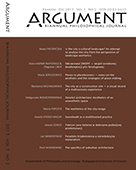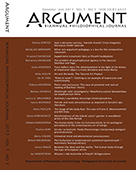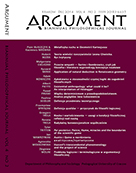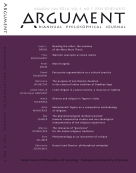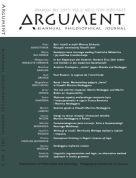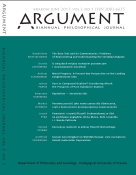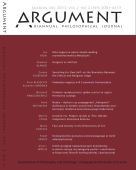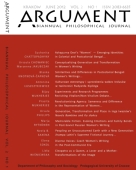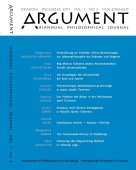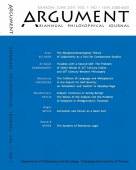e-ISSN 2084-1043 (reference version)
DOI 10.24917/20841043
ADVISORY BOARD
Seweryn BLANDZI (Polish Academy of Sciences, Warsaw, Poland)
Steffen BORGE (Nord University, Norway)
Stanisław CZERNIAK (Polish Academy of Sciences, Warsaw, Poland)
Paweł DYBEL (Polish Academy of Sciences, Warsaw, Poland)
Markus ENDERS (University of Freiburg, Germany)
Tadeusz GADACZ (AGH – University of Science and Technology, Poland)
Jean GREISCH (École Normale Supérieure, Paris, France)
Mustafa GÜNAY (Çukurova University, Adana, Turkey)
Paweł KŁOCZOWSKI (Pedagogical University of Cracow, Poland)
Krzysztof KOSIOR (Maria Curie-Skłodowska University, Lublin, Poland)
Viktoria LYSENKO (Institute of Philosophy, Russian Academy of Sciences, Moscow, Russia)
Roger MELIN (University of Dalarna, Falun, Sweden)
Jacek MIGASIŃSKI (Warsaw University, Poland)
Asha MUKHERJEE (Visva-Bharati University, Santiniketan, India)
Joachim PIECUCH (Opole University, Poland)
Maria POPCZYK (University of Silesia, Poland)
Chakravarthi RAM-PRASAD (University of Lancaster, UK)
Wojciech SADY (Pedagogical University of Cracow, Poland)
Zoltán SOMHEGYI (Károli Gáspár University of the Reformed Church in Hungary, Budapest)
Philipp THOMAS (University of Education in Weingarten, Germany)
Ludwig WENZLER (University of Freiburg, Germany)
Adam WĘGRZECKI (Cracow University of Economics, Poland) †
Ethical principles and reviewing standards. We stick to the double-blind reviewing procedure, in which both authors and referees are anonymous. The external reviewers are specialists in the particular field and area the paper refers to. They all use a standardised Reviewer’s Form designed by the Editors to ensure clear and conclusive evaluation. The complete List of Reviewers is published annually online.
By submitting the paper to the Editors, the Author declares his or her authorship and originality of the text, reports possible co-authorship or co-operation of other subjects in the manuscript preparation, conforms the paper to the editorial standards accepted by the journal. For more details see notes to contributors. Besides, when submitting the paper the Author must accept the following reviewing procedure. The final decision about acceptance or rejection of the paper is usually taken within 8 weeks after submission. Editors maintain regular communication with authors throughout the process. Our transparent reviewing standards include the following steps:
- The editors check the submission to judge whether it respects the academic and editorial standards and has some chance of ultimately being accepted.
- The submitted paper is given an ID number which replaces the name of the author on the next steps of the reviewing process.
- The editors select and invite two external reviewers being the specialists in the field to review the submission. The reviews are prepared according to a form sent by the editors, which makes the evaluation clear and conclusive.
- The overall evaluation of the paper depends on meeting the following criteria: (1) subject area of the paper fits well to the profile of the journal; (2) paper is original, insightful, and it reveals a new aspect of the issue under question, it is thought-provoking, invites polemics and/or can inspire further research in the field; (3) paper discusses the subject matter diligently and thoroughly, it can serve as a good introduction to the issue under question, has a didactic value; (4) bibliography used in the paper is sufficient, it covers the most essential and up-to-date publications corresponding to the subject matter; (5) paper is well written, in good style proper for academic publications. Each decision on a submission falls into one of the following 3 categories:
- “Accepted” – no further revisions or review are required before the article appears in an upcoming issue of “Argument: BPJ”.
- “Accepted with requirement of some revisions” – if the authors complete the set of “minor revisions” that have been listed explicitly as such by the reviewers, the editors will check the revisions. If they are judged to be adequate, the revised article will appear in an upcoming issue of the journal.
- “Rejected” – the submission in the present shape is not acceptable. Therefore, the author is encouraged to submit a thoroughly rewritten version of the manuscript, taking into account all the critiques and suggestions of the reviewers and the editors.
- Once the reviews have been received, the conclusion is sent to the corresponding author by email with the possible suggestions and criticisms serving to improve the submitted material (normally the corrections should be made within 1 week).
- If the reviewers have no objections to the submission and when the author has complied with the requirements of the editors, the submitted paper is ultimately accepted for publication in the particular issue of the journal.
For more details on the reviewing procedure see: notes to contributors.

